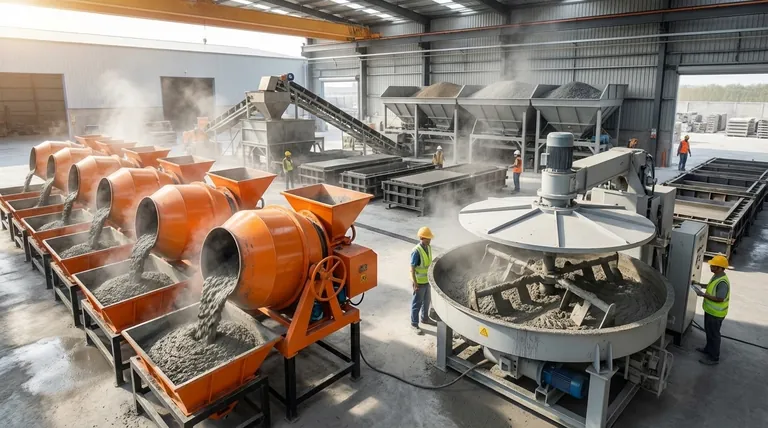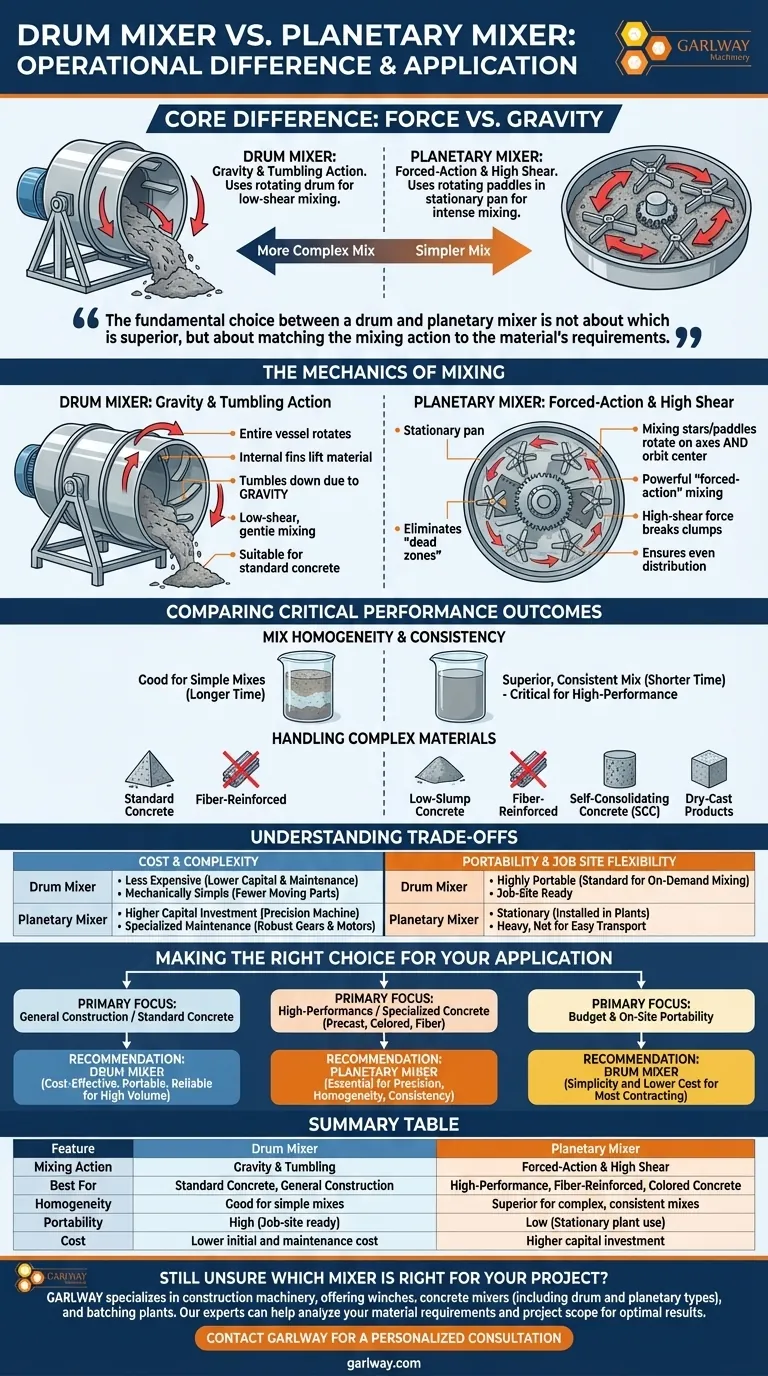At its core, the operational difference is one of force versus gravity. A drum mixer uses a rotating drum to tumble materials together using gravity, whereas a planetary mixer uses a set of rotating blades or paddles inside a stationary pan to apply intense, high-shear force for a more homogenous mixture.
The fundamental choice between a drum and planetary mixer is not about which is superior, but about matching the mixing action to the material's requirements. Drum mixers are for simple bulk mixing, while planetary mixers are for precision-engineered, complex materials.

The Mechanics of Mixing: Two Fundamentally Different Approaches
To understand which mixer is right for your application, you must first appreciate their distinct mechanical actions. The method of agitation directly determines the quality, consistency, and type of material that can be successfully mixed.
The Drum Mixer: Gravity and Tumbling Action
A drum mixer operates on a simple principle: the entire vessel rotates. Internal fins lift the material to the top of the drum, which then tumbles back down due to gravity.
This process is repeated, folding the materials over one another. It's a low-shear, gentle mixing method best suited for standard concrete or where perfect homogeneity isn't the primary concern.
The Planetary Mixer: Forced-Action and High Shear
A planetary mixer, by contrast, uses a stationary pan. Inside, one or more "mixing stars" or paddles rotate on their own individual axes while also orbiting the center of the pan, much like planets orbiting the sun.
This creates a powerful "forced-action" mixing. The blades move through the entire batch in multiple directions, applying high-shear force that actively breaks down clumps and ensures every particle is coated and evenly distributed. This aggressive action eliminates "dead zones" within the mix.
Comparing Critical Performance Outcomes
The mechanical differences in drum and planetary mixers lead to significant variations in the final product and the types of materials they can effectively handle.
Mix Homogeneity and Consistency
The forced action of a planetary mixer produces a significantly more homogenous and consistent mix in a shorter amount of time. This is critical for high-performance concrete, precast elements, or applications using complex admixtures and colors.
Drum mixers can sometimes struggle to evenly distribute all components, especially fine powders or fibers, relying on a longer mixing time to achieve a reasonable consistency.
Handling of Complex Materials
Planetary mixers excel with challenging materials. Their high-shear action is necessary for properly mixing low-slump concrete, fiber-reinforced concrete, self-consolidating concrete (SCC), and dry-cast products.
A drum mixer’s gentle tumbling is often insufficient for these specialized applications, failing to properly disperse fibers or fully hydrate low water-to-cement ratio mixes.
Understanding the Trade-offs
The superior mixing performance of a planetary mixer comes with practical and financial considerations that make a drum mixer the better choice for many situations.
Cost and Complexity
Drum mixers are mechanically simple, making them significantly less expensive to purchase and maintain. Their design has fewer moving parts and less complex gearing.
Planetary mixers are precision machines with powerful motors and robust gearboxes, representing a much higher capital investment and requiring more specialized maintenance.
Portability and Job Site Flexibility
The simple design of drum mixers makes them highly portable. They are the standard for small-to-medium-sized job sites where concrete is mixed on demand.
Planetary mixers are typically heavy, stationary units installed in precast plants or large batching facilities. They are not designed for easy transport.
Making the Right Choice for Your Application
Selecting the correct mixer depends entirely on the requirements of your project and the nature of the material you are producing.
- If your primary focus is general construction or standard concrete: A drum mixer provides a cost-effective, portable, and reliable solution for high-volume needs.
- If your primary focus is high-performance or specialized concrete (precast, colored, fiber-reinforced): A planetary mixer is essential for achieving the required precision, homogeneity, and material consistency.
- If your primary focus is budget and on-site portability: The simplicity and lower cost of a drum mixer make it the clear choice for most contracting work.
Ultimately, matching the mixer's operational mechanics to your material's specifications is the key to achieving a high-quality outcome.
Summary Table:
| Feature | Drum Mixer | Planetary Mixer |
|---|---|---|
| Mixing Action | Gravity & Tumbling | Forced-Action & High Shear |
| Best For | Standard Concrete, General Construction | High-Performance, Fiber-Reinforced, Colored Concrete |
| Homogeneity | Good for simple mixes | Superior for complex, consistent mixes |
| Portability | High (Job-site ready) | Low (Stationary plant use) |
| Cost | Lower initial and maintenance cost | Higher capital investment |
Still unsure which mixer is right for your specific project?
GARLWAY specializes in construction machinery, offering a full range of winches, concrete mixers (including drum and planetary types), and concrete batching plants for construction companies and contractors globally. Our experts can help you analyze your material requirements and project scope to select the perfect equipment for optimal results and efficiency.
Contact GARLWAY today for a personalized consultation and quote!
Visual Guide

Related Products
- Concrete Cement Mixer Machine Drum Mixer for Construction
- Ready Mixer Machine for Construction Ready Mix Machinery
- JS1000 Volumetric Concrete Mortar Mixer for Sale Skid Steer Cement Mixer
- Commercial Electric Concrete Mixer Machine HZS 50 Small Batch Plant for Sale
- Shaft Mixer Machine for Cement and Regular Concrete Mixing
People Also Ask
- How much time required to mix concrete in a mixture machine? Optimize for Strength & Efficiency
- What are the differences between steel and polyethylene mixing drums? Boost Your Mixer's Lifespan & Efficiency
- What factors should be considered when selecting a mobile concrete mixer? Maximize Your Project's Efficiency
- What specifications should the discharge ring of a self-falling mixer meet? Ensure Operational Stability and Longevity
- What are the main components of a volumetric mixer? The Mobile Concrete Plant Explained
- What are the advantages of using rotating drum mixers? Achieve Gentle, Homogeneous Mixing for Fragile Materials
- When was the first concrete mixer developed and by whom? Discover the 1900 Breakthrough
- How does a concrete mixer improve concrete quality? Ensure Strength & Consistency for Your Build


















